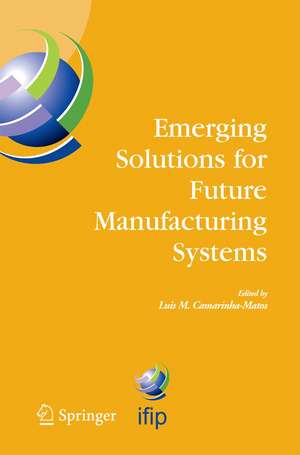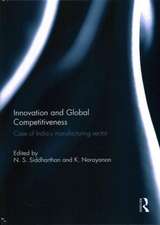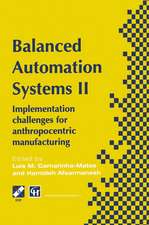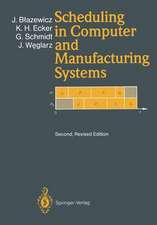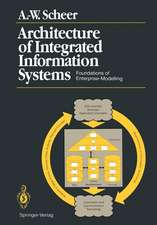Emerging Solutions for Future Manufacturing Systems: IFIP TC 5 / WG 5.5. Sixth IFIP International Conference on Information Technology for Balanced Automation Systems in Manufacturing and Services, 27-29 September 2004, Vienna, Austria: IFIP Advances in Information and Communication Technology, cartea 159
Editat de Luis M. Camarinha-Matosen Limba Engleză Paperback – 2 dec 2014
In this context two main characteristics emerge as key properties of a modern automation system – agility and distribution. Agility because systems need not only to be flexible in order to adjust to a number of a-priori defined scenarios, but rather must cope with unpredictability. Distribution in the sense that automation and business processes are becoming distributed and supported by collaborative networks.
Emerging Solutions for Future Manufacturing Systems includes the papers selected for the BASYS’04 conference, which was held in Vienna, Austria in September 2004 and sponsored by the International Federation for Information Processing (IFIP).
| Toate formatele și edițiile | Preț | Express |
|---|---|---|
| Paperback (1) | 1114.00 lei 6-8 săpt. | |
| Springer Us – 2 dec 2014 | 1114.00 lei 6-8 săpt. | |
| Hardback (1) | 654.77 lei 6-8 săpt. | |
| Springer Us – 13 sep 2004 | 654.77 lei 6-8 săpt. |
Din seria IFIP Advances in Information and Communication Technology
- 20%
 Preț: 170.51 lei
Preț: 170.51 lei - 20%
 Preț: 615.74 lei
Preț: 615.74 lei - 20%
 Preț: 340.32 lei
Preț: 340.32 lei -
 Preț: 397.38 lei
Preț: 397.38 lei - 20%
 Preț: 336.02 lei
Preț: 336.02 lei - 20%
 Preț: 340.98 lei
Preț: 340.98 lei - 20%
 Preț: 503.41 lei
Preț: 503.41 lei - 17%
 Preț: 523.40 lei
Preț: 523.40 lei - 20%
 Preț: 502.06 lei
Preț: 502.06 lei - 17%
 Preț: 488.96 lei
Preț: 488.96 lei - 20%
 Preț: 501.04 lei
Preț: 501.04 lei - 20%
 Preț: 403.20 lei
Preț: 403.20 lei - 15%
 Preț: 708.83 lei
Preț: 708.83 lei - 20%
 Preț: 1162.12 lei
Preț: 1162.12 lei - 20%
 Preț: 1288.25 lei
Preț: 1288.25 lei - 18%
 Preț: 1227.21 lei
Preț: 1227.21 lei - 20%
 Preț: 1282.00 lei
Preț: 1282.00 lei - 18%
 Preț: 1224.18 lei
Preț: 1224.18 lei - 18%
 Preț: 953.03 lei
Preț: 953.03 lei - 18%
 Preț: 953.20 lei
Preț: 953.20 lei - 18%
 Preț: 944.99 lei
Preț: 944.99 lei - 18%
 Preț: 948.29 lei
Preț: 948.29 lei - 15%
 Preț: 645.47 lei
Preț: 645.47 lei - 18%
 Preț: 960.13 lei
Preț: 960.13 lei - 20%
 Preț: 1288.11 lei
Preț: 1288.11 lei - 20%
 Preț: 998.70 lei
Preț: 998.70 lei - 18%
 Preț: 949.23 lei
Preț: 949.23 lei - 20%
 Preț: 1283.81 lei
Preț: 1283.81 lei - 20%
 Preț: 995.89 lei
Preț: 995.89 lei - 15%
 Preț: 645.79 lei
Preț: 645.79 lei - 20%
 Preț: 1276.74 lei
Preț: 1276.74 lei - 20%
 Preț: 1922.99 lei
Preț: 1922.99 lei - 20%
 Preț: 1285.97 lei
Preț: 1285.97 lei - 18%
 Preț: 956.69 lei
Preț: 956.69 lei - 18%
 Preț: 946.72 lei
Preț: 946.72 lei - 18%
 Preț: 1224.36 lei
Preț: 1224.36 lei - 20%
 Preț: 1277.89 lei
Preț: 1277.89 lei - 18%
 Preț: 953.03 lei
Preț: 953.03 lei - 18%
 Preț: 947.98 lei
Preț: 947.98 lei - 20%
 Preț: 1292.54 lei
Preț: 1292.54 lei - 18%
 Preț: 956.18 lei
Preț: 956.18 lei - 20%
 Preț: 645.79 lei
Preț: 645.79 lei - 18%
 Preț: 1235.25 lei
Preț: 1235.25 lei - 20%
 Preț: 1284.47 lei
Preț: 1284.47 lei - 18%
 Preț: 1231.01 lei
Preț: 1231.01 lei - 20%
 Preț: 993.09 lei
Preț: 993.09 lei - 20%
 Preț: 1288.94 lei
Preț: 1288.94 lei - 20%
 Preț: 987.17 lei
Preț: 987.17 lei - 18%
 Preț: 1833.33 lei
Preț: 1833.33 lei
Preț: 1114.00 lei
Preț vechi: 1358.53 lei
-18% Nou
Puncte Express: 1671
Preț estimativ în valută:
213.17€ • 223.12$ • 177.42£
213.17€ • 223.12$ • 177.42£
Carte tipărită la comandă
Livrare economică 31 martie-14 aprilie
Preluare comenzi: 021 569.72.76
Specificații
ISBN-13: 9781489999627
ISBN-10: 1489999620
Pagini: 540
Ilustrații: XII, 525 p.
Dimensiuni: 155 x 235 x 28 mm
Greutate: 0.75 kg
Ediția:2005
Editura: Springer Us
Colecția Springer
Seria IFIP Advances in Information and Communication Technology
Locul publicării:New York, NY, United States
ISBN-10: 1489999620
Pagini: 540
Ilustrații: XII, 525 p.
Dimensiuni: 155 x 235 x 28 mm
Greutate: 0.75 kg
Ediția:2005
Editura: Springer Us
Colecția Springer
Seria IFIP Advances in Information and Communication Technology
Locul publicării:New York, NY, United States
Public țintă
ResearchCuprins
Keynote.- Networked RFID in Industrial Control: Current and Future.- Multi-Agent and Holonic Systems in Manufacturing.- Implementation Issues with Holonic Control Device Communication Interfaces.- Making a Perfect ‘Gin and Tonic’: Mass-Customisation Using Holons.- Holonic Manufacturing Control: A Practical Implementation.- Contingencies-Based Reconfiguration of Holonic Control Devices.- The MaBE Middleware.- Agent-Based Simulation: Mast Case Study.- Agent-Based Architecture for Information Handling in Automation Systems.- An Intelligent Agent Validation Architecture for Distributed Manufacturing Organizations.- Multi-Agent Based Framework for Large Scale Visual Program Reuse.- Integrating Multi-Agent Systems: A Case Study.- Alarm Root Cause Detection System.- A Methodology for Shop Floor Reengineering Based on Multiagents.- Agent-Based Distributed Collaborative Monitoring and Maintenance in Manufacturing.- Mobile Access to Process Knowledge: An Agent-Based Approach.- Reliable Communications for Mobile Agents — The Telecare Solution.- An Empirical Research in Intelligent Manufacturing: A Frame Based Representation of Ai Usages in Manufacturing Aspects.- Preference Based Scheduling for an HMS Environment.- Optimization Algorithm for Dynamic Multi-Agent Job Routing.- Agent System Application in High-Volume Production Management.- Multi-Agent Based Robust Scheduling for Agile Manufacturing.- Fusion-Based Intelligent Support for Logistics Management.- Networked Enterprises.- Intelligent and Dynamic Plugging of Components — An Example for Networked Enterprises Applications.- Web Services/Agent-Based Model for Inter-Enterprise Collaboration.- Interoperability Among Its Systems with Its-Ibus Framework.- Analysis of Requirements for Collaborative ScientificExperimentation Environments.- A Knowledge Management Based Framework as a Way for SME Networks Integration.- Collaborative E-Engineering Environments to Support Integrated Product Development.- Applying a Benchmarking Methodology to Empower a Virtual Organisation.- A Contribution to Understand Collaboration Benefits.- Predictive Performance Measurement in Virtual Organisations.- Multi Layers Supply Chain Modeling Based on Multiagents Approach.- A Formal Theory of BM Virtual Enterprises Structures.- A Distributed Knowledge Base for Manufacturing Scheduling.- Efficiently Managing Virtual Organizations Through Distributed Innovation Management Processes.- SME-Service Networks for Cooperative Operation of Robot Installations.- Information Infrastructures and Sustainability.- Integrated Design and Assembly.- Knowledge-Based Requirements Engineering for Reconfigurable Precision Assembly Systems.- Definitions, Limitations and Approaches of Evolvable Assembly System Platforms.- Benefits of Modularity and Module Level Tests.- Automated System for Leather Inspection: The Machine Vision.- A Simulation Based Research of Alternative Organizational Structures in Sewing Unit of A Textile Factory.- Modelling and Simulation of Human-Centred Assembly Systems - A Real Case Study.- Vertical Integration on Industrial Examples.- Decision Support When Configuring Automatic Systems.- A Maintenance Policy Selection Tool for Industrial Machine Parts.- Machine Learning and Data Mining in Industry.- Using Data Mining for Virtual Enterprise Management.- Mining Rules from Monotone Classification Measuring Impact of Information Systems on Business Competitiveness.- An Application of Machine Learning for Internet Users.- Evaluating a Software Costing Method Based on Software Features and Case BasedReasoning.- Reduction Techniques for Instance Based Text Categorization.- Application of Soft Computing Techniques to Classification of Licensed Subjects.- One-Class Learning for Human-Robot Interaction.- Knowledge Acquisition from Historical Data for Case Oriented Supervisory Control.- Cepstral Analysis in Tool Monitoring.- Intelligent Diagnosis and Learning in Centrifugal Pumps.
Textul de pe ultima copertă
EMERGING SOLUTIONS FOR
FUTURE MANUFACTURING SYSTEMS
Edited by: Luis M. Camarinha-Matos
Industries and particularly the manufacturing sector have been facing difficult challenges in a context of socio-economic turbulence which is characterized by complexity as well as the speed of change in causal interconnections in the socio-economic environment. In order to respond to these challenges companies are forced to seek new technological and organizational solutions. Information technology plays a fundamental role in this process but sustainable advances in industry also need to consider the human aspects, what led to the concept of "balanced automation systems" in an attempt to center the discussion on the balance between the technical aspects of automation and the human and social facets. Similar challenges are faced by the service sector.
In this context two main characteristics emerge as key properties of a modern automation system – agility and distribution. Agility because systems need not only to be flexible in order to adjust to a number of a-priori defined scenarios, but rather must cope with unpredictability. Distribution in the sense that automation and business processes are becoming distributed and supported by collaborative networks. These networks can be observed at the inter-enterprise collaboration level, but also at the shop floor level where more and more control systems are designed as networks of autonomous and collaborative nodes. Multi-agent, holonic and intelligent systems approaches play, naturally, a major role here. Advances in communications and ubiquitous computing, including the new wireless revolution, are fundamental enablers for these processes.
This book includes the papers selected for the BASYS’04 conference, which was held in Vienna, Austria in September 2004 and sponsored by the International Federation for Information Processing (IFIP).
Emerging Solutions for Future Manufacturing Systems is essential reading for researchers and engineering students in production engineering, computer science, collaborative networks, artificial intelligence, electrical engineering, mechanical engineering, and industrial sociology, as well as for engineers, industrial managers and practitioners in manufacturing and service provision systems organization and planning.
FUTURE MANUFACTURING SYSTEMS
Edited by: Luis M. Camarinha-Matos
Industries and particularly the manufacturing sector have been facing difficult challenges in a context of socio-economic turbulence which is characterized by complexity as well as the speed of change in causal interconnections in the socio-economic environment. In order to respond to these challenges companies are forced to seek new technological and organizational solutions. Information technology plays a fundamental role in this process but sustainable advances in industry also need to consider the human aspects, what led to the concept of "balanced automation systems" in an attempt to center the discussion on the balance between the technical aspects of automation and the human and social facets. Similar challenges are faced by the service sector.
In this context two main characteristics emerge as key properties of a modern automation system – agility and distribution. Agility because systems need not only to be flexible in order to adjust to a number of a-priori defined scenarios, but rather must cope with unpredictability. Distribution in the sense that automation and business processes are becoming distributed and supported by collaborative networks. These networks can be observed at the inter-enterprise collaboration level, but also at the shop floor level where more and more control systems are designed as networks of autonomous and collaborative nodes. Multi-agent, holonic and intelligent systems approaches play, naturally, a major role here. Advances in communications and ubiquitous computing, including the new wireless revolution, are fundamental enablers for these processes.
This book includes the papers selected for the BASYS’04 conference, which was held in Vienna, Austria in September 2004 and sponsored by the International Federation for Information Processing (IFIP).
Emerging Solutions for Future Manufacturing Systems is essential reading for researchers and engineering students in production engineering, computer science, collaborative networks, artificial intelligence, electrical engineering, mechanical engineering, and industrial sociology, as well as for engineers, industrial managers and practitioners in manufacturing and service provision systems organization and planning.
Caracteristici
Cutting-edge research offers emerging solutions to support agility and distributed collaborative networks in future manufacturing and service support systems Sixth in the BASYS conference series, explores new challenges faced by the integration of knowledge and technology as major drivers for business changes, considering product and services life cycles Includes supplementary material: sn.pub/extras
